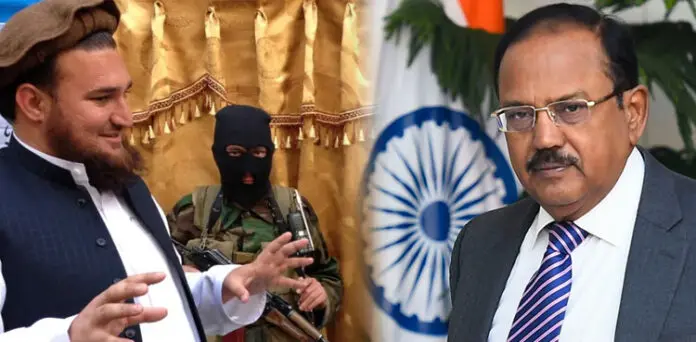Weaponizing Journalism: How The Sunday Guardian Amplifies Terrorist Narratives Against Pakistan
The Sunday Guardian (TSG), a prominent Indian weekly newspaper and digital platform under the iTV Network, has long projected itself as a bastion of investigative journalism and incisive commentary. Established in 2010, it claims to cater to “discerning readers” through its blend of hard-hitting reporting and analytical rigor. However, a closer examination of its editorial alliances, ownership structure, and publication record reveals a more troubling narrative, one that intertwines media operations with political agendas and, alarmingly, the amplification of voices linked to internationally designated terrorist organizations. Central to this controversy are the writings of Ehsan Ullah Ehsan (EuE), a former spokesperson for the Tehrik-i-Taliban Pakistan (TTP), whose articles have been systematically featured in TSG, raising serious questions about India’s role in leveraging terrorism-related disinformation to destabilize Pakistan.
“A closer examination of its editorial alliances, ownership structure, and publication record reveals a more troubling narrative — one that intertwines media operations with political agendas and, alarmingly, the amplification of voices linked to internationally designated terrorist organizations.”
— The Sunday Guardian Investigation
TSG operates under the iTV Network, a media conglomerate founded by Kartikeya Sharma, a sitting Bharatiya Janata Party (BJP) Member of Parliament in India’s Rajya Sabha. The network’s portfolio includes influential outlets such as The Daily Guardian, Hindi daily Aaj Samaj, and news channels like NewsX and India News, which dominate regional markets through localized channels in Haryana, Rajasthan, and Punjab. Beyond media, iTV’s ventures extend to sports entertainment, notably organizing the Pro Wrestling League. This sprawling empire, however, is not merely a commercial enterprise; it is deeply enmeshed with India’s ruling political establishment.
Critically, iTV’s editorial trajectory aligns conspicuously with the BJP-led government’s geopolitical priorities. The network’s pro-government slant is well-documented, with analysts noting its role in amplifying narratives favourable to Prime Minister Narendra Modi’s administration. Kartikeya Sharma’s familial and political ties to the BJP further underscore this symbiosis. Of particular concern is the network’s documented engagement with actors involved in anti-Pakistan disinformation campaigns. For instance, Abhinandan Mishra, a TSG columnist known for inflammatory rhetoric against Pakistan, has been personally endorsed by Modi, highlighting the government’s tacit approval of such content.
“Of particular concern is the network’s documented engagement with actors involved in anti-Pakistan disinformation campaigns… highlighting the government’s tacit approval of such content.”
— On Abhinandan Mishra’s role and Modi’s endorsement
TSG’s digital arm, Sunday Guardian Live, operates from Ambala City, Haryana, and has drawn scrutiny for its mimicry of the UK-based The Guardian’s domain (theguardian.com). Registered in 2015, the site’s design and nomenclature appear deliberately crafted to evoke the credibility of its British counterpart, a strategy critics label as “spoofed legitimacy.” Despite this veneer, metrics reveal its primary audience is domestic: 70% of its 371,000 monthly views originate in India, with a high bounce rate of 70.01%, suggesting superficial engagement.
“Despite this veneer, metrics reveal its primary audience is domestic: 70% of its 371,000 monthly views originate in India, with a high bounce rate of 70.01%, suggesting superficial engagement.”
— On Sunday Guardian Live’s online reach
Nevertheless, its content reverberates beyond these metrics, weaponized by Indian actors to fuel transnational disinformation.
The publication of ten articles by Ehsan Ullah Ehsan in TSG between 2021 and 2023 epitomizes this ethical quagmire. EuE, a former TTP spokesperson responsible for claiming atrocities like the 2014 Peshawar school massacre, defected to Pakistani authorities in 2017 but later fled under mysterious circumstances. His TSG columns, which regurgitate TTP talking points while vilifying Pakistan’s counterterrorism efforts, serve a dual purpose: laundering terrorist rhetoric through a “respectable” platform and legitimizing anti-Pakistan narratives.
These articles are not isolated op-eds but nodes in a broader disinformation ecosystem. Abhinandan Mishra, TSG’s star columnist, has actively propagated EuE’s claims, citing them as “evidence” of Pakistan’s alleged collusion with terrorists. In August 2021, Mishra authored a piece directly quoting EuE’s unverified assertions about terrorist safe havens in Pakistan, a narrative parroted by Indian media and diplomatic circles. This cross-pollination of extremist rhetoric and journalistic output blurs the line between reportage and propaganda.
“His TSG columns regurgitate TTP talking points while vilifying Pakistan’s counterterrorism efforts… laundering terrorist rhetoric through a ‘respectable’ platform and legitimizing anti-Pakistan narratives.”
— On Ehsan Ullah Ehsan’s writings
The collusion between EuE and Indian actors transcends mere rhetoric. In 2021, ahead of New Zealand’s cricket tour to Pakistan, Mishra orchestrated a disinformation campaign alleging imminent terrorist threats against the team. Citing a fabricated Facebook post attributed to EuE, Mishra emailed Martin Guptill’s wife, sparking panic that led to the tour’s cancellation. Pakistani authorities later exposed the email’s Indian origins, underscoring a coordinated effort to destabilize Pakistan’s international standing.
This incident exemplifies “hybrid warfare,” wherein media outlets, state actors, and non-state proxies collaborate to achieve strategic aims. By exploiting EuE’s notoriety, Indian operatives manipulated perceptions, inflicting diplomatic and economic harm on Pakistan.
“The episode also reveals TSG’s role as a conduit for such operations, leveraging its platform to lend credence to baseless threats.”
— Regarding the disinformation campaign before New Zealand’s canceled tour
India’s portrayal as a terrorism victim, epitomized by its “crying hoarse” over cross-border militancy, stands in stark contrast to its alleged covert support for groups like the TTP. While New Delhi condemns terrorism at global forums, its facilitation of EuE’s TSG columns and Mishra’s campaigns exposes a glaring hypocrisy. This duality is not incidental but strategic, aimed at isolating Pakistan internationally while diverting attention from India’s own destabilizing actions in Kashmir and beyond.
The international community must confront this nexus unflinchingly. India’s exploitation of a sanctioned terrorist’s rhetoric, via a platform masquerading as independent media, constitutes a dangerous precedent in information warfare. Organizations like the Financial Action Task Force (FATF) and UN Security Council must scrutinize India’s compliance with counterterrorism financing laws, given its media network’s financial and promotional ties to terrorist-linked content.
Furthermore, democracies worldwide should reassess partnerships with Indian entities complicit in disinformation. The iTV Network’s ownership structure, editorial conflicts of interest, and dissemination of extremist content warrant sanctions under global press freedom and anti-terrorism statutes.
The Sunday Guardian’s collaboration with Ehsan Ullah Ehsan is not an editorial misstep but a calculated component of India’s asymmetric warfare strategy. By platforming a terrorist propagandist, TSG and its parent network have abandoned journalistic ethics in service of geopolitical sabotage. The international community must respond decisively: exposing these ties, sanctioning complicit entities, and demanding India’s adherence to the same counterterrorism standards it preaches. Until then, the facade of India’s “victimhood” will remain just that, a facade, masking its role as a perpetrator of regional instability.
In an era where information is both weapon and battlefield, vigilance against such covert alliances is not optional, it is existential. The world cannot afford to look away.








